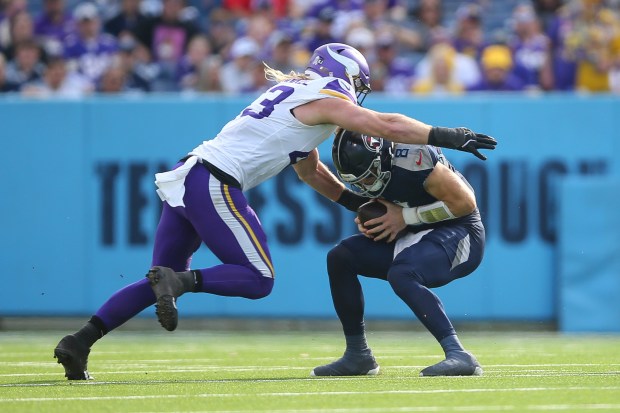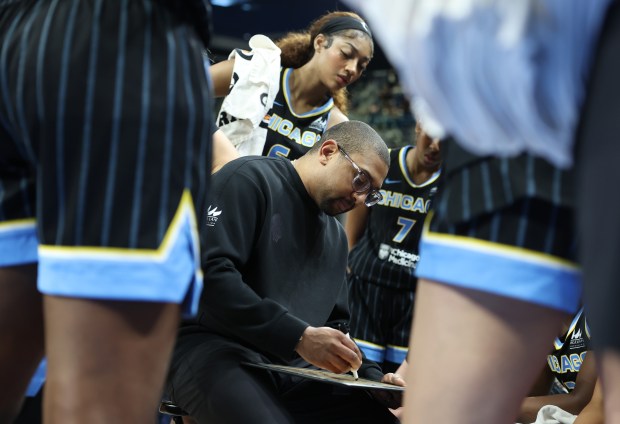The first thing that comes to mind with the Minnesota Vikings is the aggressive, foot-on-the-gas approach defensive coordinator Brian Flores brings in terms of a pass rush.
“He’s the king of the Cover-0 blitz,” Chicago Bears quarterback Caleb Williams said Wednesday afternoon.
The variety of blitzes and fronts the Vikings show can be overwhelming for experienced quarterbacks, and it showed up on the first snap of the game last season when the Vikings visited Soldier Field. They rushed six defenders and D.J. Wonnum went unblocked off the edge, tattooing Justin Fields from behind for a sack.
As the Bears plot ways to build off the offensive showing they had in the 20-19 loss to the Green Bay Packers, they have to find ways to continue to run the ball effectively. The Vikings bring the league’s No. 1-ranked run defense to town.
Thomas Brown, who took over as offensive coordinator last week, pledged that everything starts up front, and he remained true to his word. The Bears ran the ball effectively against the Packers with 179 yards. They are 3-2 in games in which they rushed for more than 100 yards, with the two losses both coming on the game’s final play — versus the Packers and Oct. 27 against the Washington Commanders. They’re 1-4 in games they failed to reach 100 yards.
It’s an overly simplistic way to chart a path to victory for the Bears on Sunday, but they must run the ball well enough to stay ahead of the chains and remain balanced so Williams has a chance. The Vikings are allowing only 74.4 rushing yards per game and have been even more stingy recently. Over the last three games, opponents have totaled only 157 yards rushing on 56 carries (2.8 average).
“They’ve got some really underrated dudes on their defense,” tight end Cole Kmet said. “Some guys who I think are playing the best in the league right now and don’t get the credit for it. (Outside linebacker) Andrew Van Ginkel looks really good. Number 0 (inside linebacker Ivan Pace Jr.) looks really shifty but will come and hit you. They’ve got some good players.
“They’re physical and they bring so many different looks. There is going to be a lot on us up front to make sure we ID things correctly, get it communicated right so we can get the run game going.”
With D’Andre Swift nursing a minor groin injury — he missed practice Wednesday — the Bears are going to have their hands full, although it sounds like he could be good by Sunday. As coach Matt Eberflus stated, the Vikings lead the league in forcing opponents into second-and-long situations and they’re No. 4 in the league on first down, allowing 4.68 yards per play; the Bears offense is fourth-worst, averaging 4.57 yards.
Second-and-long is no way to make a living against the Vikings, who are tied for third in the NFL with 35 sacks and have three outside linebackers with seven or more — Van Ginkel with eight and Pat Jones and Jonathan Greenard with seven each.
“Staying committed to the run game, I think that’s an important piece to it,” Eberflus said.
So the Bears, as best they can, have been preparing for the variety of looks and pressures, both versus the pass and run, as they’ve gotten into game-planning.
“Just defining it and keeping it really tight,” Eberflus said. “Not too many things but things that are effective. The answers have to be defined and they’ve got to be simple and they’ve got to be correct to be able to find the space that you need to in the pass game and in the run game.”
Everything started with the running game against the Packers, and the Bears stayed on the field (season-high 56.3% conversion rate on third down). All seven possessions were seven plays or more. In comparison, the offense has had six games with four or fewer possessions of seven plays.
“We were able to get in our rhythm,” center Coleman Shelton said. “You run the ball and it kind of opens everything up after that. We want to build off it and keep the offense going.”
It’s going to be a challenge of wills. The Bears have been both very good and very poor running the ball, and the Vikings are going to set out to put Williams in clear passing situations.
“They fit up the run well, they run blitz a lot, guys flying through gaps, they create a lot of confusion up front in the run game with assignments,” said a pro scout who has studied the Vikings this season. “The fronts never look the same. They’ll walk (safety) Harrison Smith up. He’s not as fast anymore but he’s still making tackles. Camryn Bynum, the other safety, is an interchangeable guy that can roll down into the box and tackle. The corners tackle on the perimeter.
“They’re very disciplined versus the run and give you a lot of different looks that creates confusion. It’s not just the same front every time. Those are easy to practice for during the week when they’re static. We know what we’re going to get and this is how we’re going to run power, this is how we’re going to run zone. All of a sudden you’ve got a safety and/or a linebacker standing up in the A-gap. Flores does a lot to mess with basic run-game rules in terms of ‘we’re double-teaming the three-technique and climbing to the linebacker.’ Well, what if he’s not even there? They tackle. We don’t talk about that enough. The defenses that are good against the run, since the beginning of the league, they tackle.”
So the Bears are going to try to ensure they have their bases covered knowing that if they can handle pressures, there will be plays to be made.
“If you’re able to hit the answers, you can hit some big plays,” Kmet said. “There is definitely stuff out there.”





